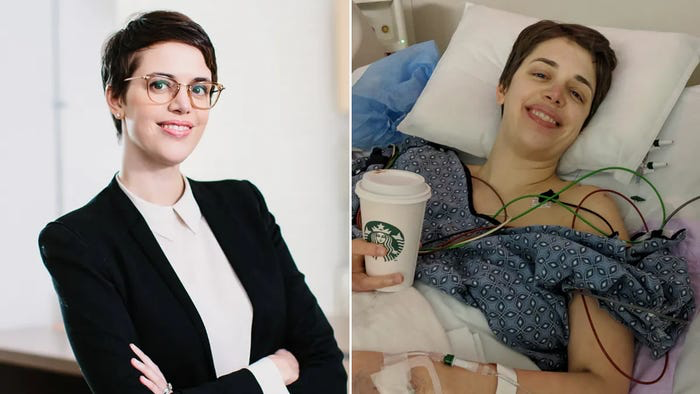“You’re young. You’re healthy. We’re not worried about cancer.” Those words echoed in doctor’s offices 2,500 miles apart. Sarah Beran heard them in Los Angeles when she mentioned blood in her stool. Brooks Bell received the same response in North Carolina. Both women felt relieved, trusted their doctors completely, and were catastrophically wrong. Within months, each would receive a stage 3 colon cancer diagnosis, joining 82% of young adults with colon cancer who get misdiagnosed initially. The reality is that symptoms of colon cancer in younger patients are often dismissed or attributed to less serious conditions, leading to delayed diagnoses with devastating consequences.
Sarah’s Early Signs of Colon Cancer

Sarah told reporters that in 2019, she was living that classic working mom life with two young kids, a styling business in LA, and the endless juggle of everyone else’s needs before her own. She felt constantly exhausted.
The blood showing up in her stool seemed obvious enough. Hemorrhoids, right? She’d just had kids. When bathroom trips became more frequent and her stomach became unbearable, she chalked it up to stress and quick meals between client appointments.
For a full year, Sarah experienced symptoms that perfectly mimicked irritable bowel syndrome. Her doctors sent her to a gastroenterologist who suggested maybe she’d picked up a parasite. Nothing too serious, he assured her. After all, look at her. Young, active, eating well most of the time. The at-home colon cancer screening test came back normal, which should’ve been reassuring. Sarah learned later that these tests miss about 20% of cancers, according to medical research.
When the bleeding got worse, Sarah finally pushed for a colonoscopy. The results knocked her sideways. A mass on her rectum. Over 100 polyps scattered throughout her colon. Stage 3 cancer had been quietly growing while everyone, including Sarah herself, looked the other way.
Brooks’ Parallel Path
Brooks Bell was used to taking charge, and she shared this with media outlets. As a CEO, she didn’t let problems linger. When blood appeared in her stool at 38, she called her doctor.
Her doctor delivered the phone diagnosis swiftly. Hemorrhoids. Probably nothing to worry about. When weeks passed and the bleeding didn’t stop, Brooks scheduled an in-person exam. Her doctor couldn’t find any hemorrhoids but remained confident they were lurking somewhere higher up.

Brooks couldn’t shake the feeling that something wasn’t right. She called a gastroenterologist directly, without waiting for a referral. Insurance wouldn’t cover it, but sometimes you’ve got to trust your gut. That colonoscopy uncovered stage 3 colon cancer and required removing 10 inches of her colon. Brooks had to advocate for herself every step of the way.
Read More: Cancer Rates Rising in Gen X and Millenials Compared to Older Generations, Study Finds
Why This Keeps Happening
Since 1995, people under 54 have developed colon cancer at double the previous rate, according to medical experts. What used to affect one in ten diagnoses now strikes one in five.
Overlapping symptoms create perfect conditions for misdiagnosis. Abdominal pain, changes in bowel habits, bloating, fatigue. When you’re 35 and otherwise healthy, both you and your physician are probably thinking of stress, dietary issues, or maybe irritable bowel syndrome.
Doctors can’t send every young person with stomach problems for a colonoscopy without overwhelming the healthcare system, yet somewhere in that crowd are people like Sarah and Brooks whose symptoms deserve more attention. The challenge is determining when young adults should get screened for colon cancer, especially as guidelines evolve in response to rising cases.
Researchers chase leads about gut bacteria, antibiotic overuse, environmental toxins, and dietary changes. Nobody knows for sure why colon cancer is climbing in younger adults, but when doctors catch the disease before it spreads, patients face a 91% five-year survival rate.
The Warning Signs They Want You to Know
After treatment, Sarah and Brooks connected with other young cancer patients and identified symptoms that deserved immediate attention. While researchers investigate what causes colon cancer in young adults, recognizing warning signs remains crucial.
Take blood in your stool seriously, even if you suspect hemorrhoids. Sarah’s bleeding started small and worsened, while Brooks noticed hers persisted, unlike typical hemorrhoid bleeding. Cancer bleeding tends to continue and appears darker than bright red hemorrhoid blood.
Persistent bathroom changes matter more than occasional issues. Sarah needed the bathroom more frequently with different bowel movements. Changes lasting weeks or months signal potential problems, not temporary digestive upset.
Cancer fatigue feels different from normal tiredness. Sarah’s exhaustion overwhelmed her despite adequate sleep. When you feel wiped out without clear reason, especially with other symptoms, seek medical attention.
Unexplained abdominal pain warrants investigation. Brooks felt discomfort, unlike normal digestive issues. Trust your instincts when something feels wrong. Unexplained weight loss also raises concerns. Many young cancer patients notice pounds dropping without dietary or exercise changes.
From Ignored Symptoms to Colon Cancer Advocacy

Sarah and Brooks found each other in July 2023 through the internet’s ability to connect people who share uncommon experiences. Sarah had seen Brooks’ “Lead From Behind” campaign, which featured celebrities getting colonoscopies on camera. They met on Zoom and their stories were remarkably similar.
Together, they launched Worldclass, a clothing line designed to make colonoscopies feel cool rather than terrifying. Their tote bags declare “colonoscopy enthusiast” with pride, while their streetwear features words that would make your grandmother blush.
They’re working to change how people think about preventive healthcare, especially for younger adults. Brooks describes colonoscopies as “more like a fast, cleanse, then a nap” rather than the scary medical procedure people imagine. Both women hit their five-year cancer-free marks but remember the anxiety of those early treatment days.
They want every young person experiencing persistent symptoms that could indicate colon cancer to advocate for themselves the way Brooks did. Don’t let age become an excuse for dismissing legitimate health concerns. Colon cancer caught early is highly treatable. Sarah and Brooks are living proof that persistence and self-advocacy can save your life.
Read More: How Childhood Exposure to Certain Toxins Could Increase Colorectal Cancer in Youth

